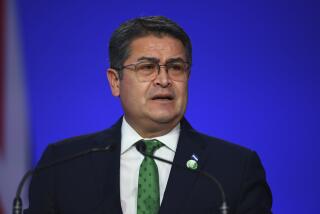Testimony Links Noriega to Marijuana Scheme
- Share via
MIAMI — Federal prosecutors broadened their case against former Panama dictator Manuel A. Noriega Thursday, introducing testimony contending that he approved a massive marijuana-smuggling scheme in addition to charges of trafficking in cocaine.
The testimony of Enrique (Kiki) Pretelt, a wealthy Panamanian and former close friend of Noriega, contained the government’s first evidence in eight weeks of trial that the deposed dictator had accepted payoffs as part of a conspiracy involving drugs other than cocaine.
Pretelt’s testimony, presented over the strenuous objections of Frank Rubino, Noriega’s defense attorney, brought an instruction from U.S. District Judge William M. Hoeveler that jurors are to consider the marijuana phase of the trial as secondary to the main case. They may use it to bolster the prosecution’s contention that Noriega had “criminal intent,” the judge said.
More evidence of this second conspiracy is expected when the trial is resumed Monday.
Pretelt, saying that he once was Noriega’s closest friend, told jurors that the late Cesar Rodriguez, his partner in an air taxi business, was approached in September, 1983, by “a gringo” who wanted “to try to establish some kind of a base in Panama” for smuggling marijuana into the United States and laundering millions of dollars through Panamanian banks.
He said that the American called himself Frank Brown. Prosecutors identified him as Steven Michael Kalish, now serving a federal prison sentence after pleading guilty in 1987 to a charge of conducting a criminal enterprise. Kalish is expected to be called as a witness.
Pretelt said Kalish boasted that he might want to launder $50 million to $80 million in the banks over a six-month period and wanted to visit Panama City “with a gift for the general.”
Kalish arrived later in September, and Noriega invited him, along with Pretelt and Rodriguez, to his home to discuss the deal, the witness testified. Pretelt said Kalish carried a briefcase to the meeting that Kalish told him contained $300,000.
“I didn’t count it,” Pretelt said in response to a question from chief prosecutor Michael P. Sullivan. “But I saw it was filled with large bills. They were hundred-dollar bills.”
Pretelt did not give jurors a full account of the alleged conspiracy Thursday but he quoted Noriega as saying to Kalish: “Anything you want to do in Panama, let me know.”
Kalish also brought $2.5 million in cash as an initial amount to be laundered, Pretelt said. He said that he took Kalish to see Noriega’s personal banker, who headed the Panama City branch of the scandal-scarred Bank of Credit & Commerce International.
Hoeveler, in a conference outside the presence of the jury, called Pretelt’s testimony “a delicate matter” because it relates to a separate indictment of Noriega returned by a federal grand jury in Tampa in February, 1988, at the same time that Noriega was charged with racketeering and cocaine-smuggling in Miami.
Rubino, in raising his objections, noted that the Miami and Tampa panels are “two separate grand juries with separate jurisdictions.” But Sullivan said that the two conspiracies are “intertwined” and Hoeveler ruled that “we’ll move ahead and take it step by step.”
Noriega is on trial for 10 counts of racketeering, conspiracy and drug-smuggling. If convicted, he could be sentenced to up to 140 years in prison and fined more than $1 million.
More to Read
Sign up for Essential California
The most important California stories and recommendations in your inbox every morning.
You may occasionally receive promotional content from the Los Angeles Times.













